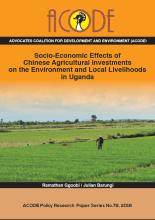Land Library
Bienvenue dans la bibliothèque du Land Portal. Explorez notre vaste collection de ressources en libre accès (plus de 74 000), comprenant des rapports, des articles scientifiques, des articles de recherche, des publications évaluées par des pairs, des documents juridiques, des vidéos et bien plus encore.
/ library resources
Showing items 1 through 9 of 31.Women face many problems with regard to land inheritance and land rights in Kenya. Individual and community land ownership do not favour women. The reason for this is that ownership of land is patrilineal, which means that fathers share land amongst sons, while excluding daughters.
While women’s rights to land and property are protected under the Kenyan Constitution of 2010 and in various national statutes, in practice, women remain disadvantaged and discriminated.
The need for affirmative action and the mainstreaming of the commons community plus a comprehensive strategy to secure indigenous and community land has become a major global concern of the 21st century.
Northern Uganda is currently recovering from a 20-year long civil war that left the area in ruins. One of the groups, the Lord’s Resistance Army, orchestrated brutal mass murders and abductions forcing nearly two million people to live internally displaced people’s (IDP) camps for over 10 years.
The need to establish the link between land tenure and food security is increasingly gaining currency as governments and development organizations refocus their effort towards assisting farmers to move away from subsistence farming to commercial agriculture.
The ways in which people obtain land in Uganda are changing fast. Land that used to be secured through inheritance, gifts or proof of long-term occupancy is now more commonly changing hands in the market.
Land acquisitions, either driven by foreign investments or domestic investment needs have continued to polarize opinions.
Kenya is going through a period of intense transition. The country's main development policy, Vision 2030, is just entering the second Medium Term Plan of Implementation from 2013.
The nature and significance of China's engagements with African agriculture continues to be hotly debated in the media, academia and policy circles around the world.









